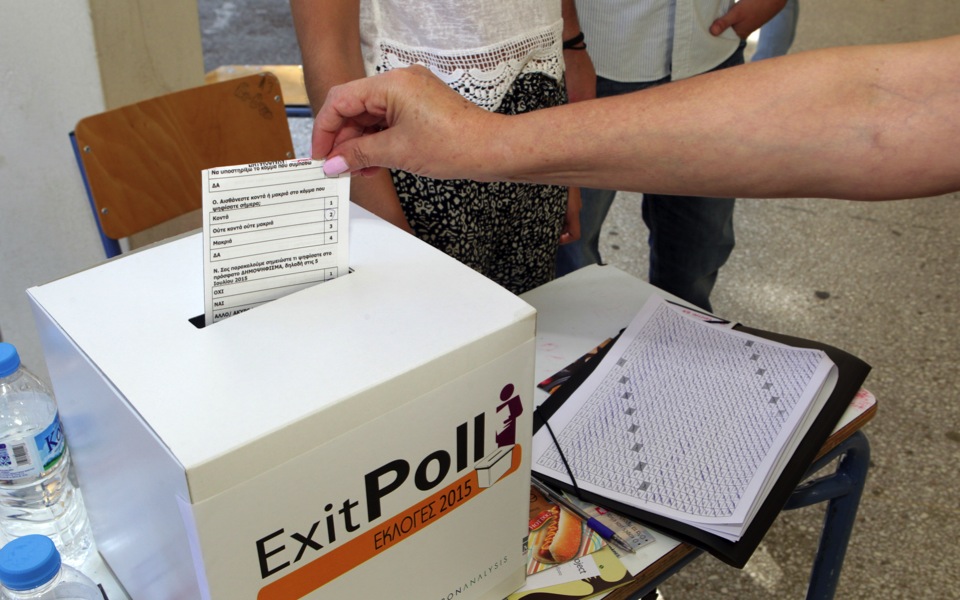Dismal failure of election pollsters

Consider the following: Would the results of Sunday’s election be any different if, two days before the ballot, poll companies had shown SYRIZA taking a clear 7.5 percent lead over New Democracy and Independent Greeks passing the threshold to enter Parliament? Could Potami have earned a better score if there hadn’t appeared to be such a tight race between SYRIZA and ND? Would Panayiotis Lafazanis have made the cut as well?
The questions are indicative, but not coincidental. A discussion on the role of polling should take place in Greece – quickly – because it is inconceivable for forecasts made by “experts” to prove, once again, to be so off the mark and the matter to come to a close with a few scattered apologies uttered on election night on television.
Even more so when it is abundantly clear that the poll forecasts published up to two days before the election not only proved erroneous, but certainly influenced a portion of citizens who consciously or not made their ballot decisions based on poll estimates.
It is nothing short of infuriating that all of the 14 companies which published data last week pointed to a difference of 0.5 or 1 percent between SYRIZA and New Democracy, while a few even showed the conservatives taking the lead.
Getting it right
With the exception of ProRata (headed by researcher Yiannis Constantinidis), which last Wednesday had pointed to a 5 percent lead for SYRIZA before lowering the final estimate to 4 percent, no other firm managed to make their prediction within half of the percentage margin reached at the ballot. Two other pollsters, GPO and the University of Macedonia, also predicted the winner, given that on Friday they estimated that SYRIZA would win the election, but only with a 2.5 percent margin.
This is not the time to look for the technical reasons behind the major failures which ended up misleading public opinion. The way in which voter samples are selected, whether demographic criteria (age, sex) should be weighted or if past votes should be considered are the sort of issues that pollsters ought to figure out among themselves. In any case, it is unthinkable that poll company presidents could end up acting as unofficial consultants to political parties and that pollsters promote the parties that the media they conduct research for support.
Another Greek quirk is the lack of any kind of scientific assessments by an authority of pollsters’ predictions.
To put it differently: In any serious private company or any other civilized country, Sunday’s exit poll – which was co-signed by all major polling firms – would have led to the pollsters’ resigning. This is because at 7 p.m., after consulting with each other, the experts predicted that the margin between the two leading parties would probably reach 1.5 percent (32 percent vs 30 percent). That was their initial estimate, as it was the average figure in the fluctuations of SYRIZA’s 30 to 34 percent and New Democracy’s 28.5 to 32.5 percent.
Not opinion polls
Exit polls are not opinion polls because they record actual votes. Therefore, the experts are called on to take the responsibility – if not the risk – to estimate specific figures within a 2 percent divergence. They are not supposed to claim that New Democracy will earn between 28.5 and 32.5 percent of the vote and that SYRIZA will garner between 30 and 34 percent in an effort to confuse viewers and try to get it right no matter what the election outcome. Mistakes are human and are made in other countries too, even at the exit poll level. But they are not repeated at every single election. In other countries someone accepts responsibility and there is no longer a general feeling that could be summed up by the following phrase: “Thank you very much for the unclear prediction. We knew just as much before the election, so why conduct an exit poll?”
The way in which this particular exit poll came about is a mystery, given that New Democracy eventually earned 28.1 percent and SYRIZA 35.5 percent. “In our final meeting one pollster insisted that New Democracy would win and threatened not to sign the final finding if we didn’t show greater divergence. So the rest of us had to comply in order to keep everyone happy,” one of the participants admitted to Kathimerini.
There is a reason why this article may come across as furious. In the last few weeks, we journalists used polls as a serious tool for possible post-election scenarios. We thought, for instance, that the winner’s highest score would be no more than 34 percent and that the largest difference between the two leading parties would not be higher than 3 to 4 percent. That is why it is necessary to issue an obvious, honest and public journalistic apology.




